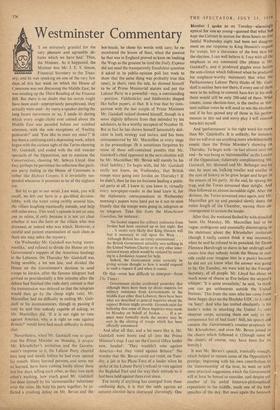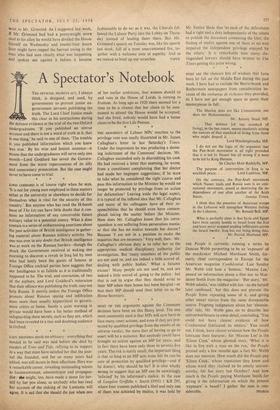Westminster Commentary
Am extremely grateful for the very pleasant and agreeable de- bates which we have had.' Thus, the Minister, As it happened, the Minister was Mr. J. E. S. Simon, Financial Secretary to the Treas- ury, and he was speaking on one of the very few days of this last week on which the House of Commons was not discussing the Middle East; he was winding up the Third Reading of the Finance Bill. But there is no doubt that. his words might have been used—appropriately paraphrased, they actually were used—by many a speaker during the long hours (seventeen or so, I made it) during which every single cliche ever coined about the Middle East was paraded before our numbed attention, with the sole exceptions of `Feelthy postcards?' and 'You like to meet my sister?' It has been a confusing and a depressing week, which began with the curious sight of the Tories cheering Mr. Gaitskell, and ended with the still weirder spectacle of the Opposition, not to mention the Conservatives, cheering Mr. Selwyn Lloyd. One may perhaps be permitted the reflection that parti- san party feeling in the House of Commons is rather like Habeas Corpus; it is invariably sus- pended whenever it promises to be of the slightest use.
But let us get to our serial. Last week, you will recall, we left our hero in a gas-filled division- lobby, with the water rising swiftly around him, the villain laughing maniacally outside, and help still miles away. This week's episode is not an easy one to relate, if only because it is not yet clear whether it was the hero or the villain who was drowned, or indeed who was which. However, a careful and patient examination of such clues as there are may solve the mystery.
On Wednesday Mr. Gaitskell was being 'states- manlike,' and refused to divide the House on the Government's support of the American landings in the Lebanon. On Thursday Mr. Gaitskell was being sensible, a lot too late, and divided the House on the Government's decision to send troops to Jordan, after the famous telegram had arrived so providentially a few minutes after the debate had finished (the rude story current is that the transmission was delayed so that the telegram would then go by the cheap night rate). Mr. Macmillan had no difficulty in nailing Mr. Gait- skell to his inconsistencies, though in passing it may be said that nobody capable of asking, as Mr. Macmillan did, If it is not right to vote against America, why is it right to vote against Britain?' would have had much difficulty in doing that.
Nevertheless, when Mr. Gaitskell rose to ques- tion the Prime Minister on Monday, a propos Mr. Khrushchev's invitation and the Govern- ment's response to it, the Labour Party cheered him long and steady before he had even opened his mouth. Many learned persons, and some not so learned, have been rushing busily about these last few days, telling each other, as they iron each other's washing, how much good Mr. Gaitskell has done himself by his 'statesmanlike' behaviour over the crisis. He held his party together; he in- flicted a crushing defeat on Mr. Bevan and the hot-heads; he chose his words with care; he re- membered the lesson of Suez, when the poorest he that was in England proved as keen on bashing the Wogs as the greatest he (and the Daily Express did not need the transparently fraudulent question it asked in its public-opinion poll last week to show that the same thing was probably true this time); in short, runs the tale, he showed himself to be of Prime Ministerial stature and put the Labour Party in a powerful—nay, a commanding —position. Fiddlesticks; and fiddlesticks shaped like ballot papers, at that. It is true that by com- parison with the last couple of Prime Ministers Mr. Gaitskell indeed showed himself, though in a sense slightly different from that intended by his adulators, to be a worthy occupant of Number 10. But in fact he has shown himself lamentably defi- cient in both strategy and tactics, and has been outmanoeuvred by Mr. Macmillan at every stage in the proceedings. (It is sometimes forgotten by some of these self-contained pundits that Mr. Gaitskell's chief opponent at the next, election will be Mr. Macmillan; Mr. Bevan will merely be his chief liability.) To begin with, did Mr. Gaitskell really not know, on Wednesday, that British troops were going into Jordan on Thursday? If he didn't, then he has no business leading a politi- cal party at all. I knew it; you knew it; virtually every newspaper-reader in the land knew it, for the diplomatic correspondents in Wednesday morning's papers were hard put to it not to state bluntly that the troops were going in, telegram or no telegram. Take this from the Manchester Guardian, for instance : No formal request for military assistance from Jordan had been received up to last night. But . . . it seems very likely that King Hussein will feel it necessary to call upon the West. . . . Although Britain has no treaty commitment . . . the British Government certainly sees nothing in the United Nations Charter or in any other inter- national treaty which would be violated by acced- ing to a Jordanian request for help.
Indeed, the Government must certainly be giving serious thought to how it would respond to such a request if and when it comes.
Or this—even less difficult to interpret—from The Times: Government circles confirmed yesterday that although there have been no direct requests for military assistance from Governments in the Middle East other than Lebanon, there have been what are described as general inquiries about the support Britain might provide. Grounds exist for believihg that some of these inquiries were made on Monday on behalf of Jordan. . . . If a re- quest were formally made the answer may be seen in the alerting of troops which has been officially announced.
And after all that, and a lot more like it, Mr. Gaitskell went boots and all into the Prime Minister's trap. I can see the Central Office leaflet now, headed: 'They wouldn't vote against America—but they voted against Britain!' No wonder that Mr. Bevan could not resist, on Tues- day, a jab at his Plaza-Toro of a leader when he spoke of the Labour Party's refusal to vote against the Baghdad Pact and the way their attitude to it had been held against them ever since.
For surely if anything has emerged from these confusing days, it is that the odds against an autumn election have shortened alarmingly. One Member I spoke to on Tuesday—alarminglY cynical for one so young—guessed that what had kept the Cabinet in session for three hours on that fateful Wednesday night had been not disagree- ment on our response to King Hussein's request for troops, but a discussion of the best date for the election. l can well believe it. 1 say with all the emphasis at my command (the phrase is Mr. Gaitskell's, and it produced giggles even before the anti-climax which followed when he produced his emphasis-worthy statement) that what the Parliamentary Labour Party thinks of Mr. Gait- skell is neither here nor there; if every one of them were to be willing to commit hara-kiri at his nod, there would still be only 280-odd of them. What counts, come election-time, is the twelve or thir- teen million votes he will need to win the election, and if he has gained any of those in his perfor- mances in this sad and sorry play I will commit hara-kiri myself.
And 'performances' is the right word for more than Mr. Gaitskell's. It is unlikely, for instance, that we will ever see anything more wholeheartedly emetic than the Prime Minister's showing on Thursday. To begin with—in fact almost until the end—he was being as 'statesmanlike' as the Leader of the Opposition; fulsomely complimenting Mr. Gaitskell, Mr. Shinwell and Mr. Bellenger one by one, he went on, bulking smaller and smaller in the eyes of history as he grew larger and larger in the esteem of his party. At the end, he sprung the trap, and the Tories screamed their delight. And then followed an almost incredible sight. After the division, the Tories screamed once again, and Mr. Macmillan got up and paraded slowly down the• entire length of the Chamber, 'waving them en- couragement to scream the louder.
After that, the weekend flashed by with dreadful haste. On Monday, Mr. Macmillan had to be vague, ambiguous and essentially discouraging in his statement about the Khrushchev invitation (though I really cannot think it was necessary, when he said he refused to be panicked, for Dame Florence Horsbrugh to shove in her orsbrugh and assure him that nobody inside the House or out- side could ever imagine him in a panic) because he did not yet know what the answer was going to be. On Tuesday, we were told by the Foreign Secretary, of all people. Mr. Lloyd has about as much sense of shame as Eve before the serpent's whisper; 'It is quite unrealistic,' he said, `to think you can get settlements outside the United Nations.' This from the man who has come from those happy days on the Hoylake UDC, to J. rdan via Suez! And who has trotted obediently his leader's wake in attacking the United T. ions observer corps, accusing them not only of in- competence but of bad faith ! Still, his speech did contain the Government's counter-proposals to Mr. Khrushchev, and even Mr. Bevan joined in the cheers which followed it. (Though some of the cheers, of course, may have been for its brevity.) It was Mr. Bevan's speech, ironically enough, which helped to restore some of the Opposition's prestige; beginning with his own contribution to the 'statesmanship' of the time, he went on with some practical suggestions which the Government will at least be bound to consider, and despite yet another of his awful historico-philosophical expositions in the middle, made one of the best speeches of the day. But once again the honours



































 Previous page
Previous page